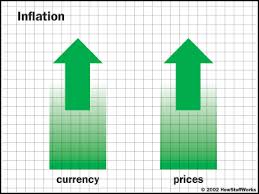
Experts Predict Further Drop In Inflation
Financial experts have predicted a further decline in Nigeria’s inflation rate on 16 April, when the National Bureau of Statistics (NBS) is expected to release its inflation data for the month of March on its website.
For instance, in a note obtained by New Telegraph, analysts at FSDH Merchant Bank, said: “FSDH Research expects the inflation rate (year-on-year) to drop to 13.49per cent in March 2018 from 14.33per cent recorded in the month of February. The drop in the rate is premised on the base effect of higher prices in the Composite Consumer Price Index (CCPI) in March 2017 than the current month.”
Besides, the firm said: “The prices of most of the food items we monitored in March 2018 recorded moderate appreciation, leading to 1.12per cent increase in our Food and Non-Alcoholic Index. The Index increased by 16.31per cent from 229.71 points recorded in March 2017. We also noticed increase in the prices of Transport and Housing, Water, Electricity, Gas & Other Fuels divisions between February and March.”
Pointing out that the value of the naira appreciated at the inter-bank market by 0.08per cent to close at $/N305.65 from $/N305.90 at the end of February, the firm averred : “The appreciation recorded at the inter-bank market between the two months under review moderated the impact of the imported consumer good prices in the domestic market.”
Also, in a note issued last weekend, analysts at Financial Derivatives Company (FDC) predicted that the inflation rate for March will drop to 13.8per cent from the 14.33per cent recorded in the month of February. They hinged their forecast on higher food output and year-on-year base effect. However, the analysts said they expect the increased private consumption occasioned by the Easter celebration coupled with expected increase in government spending to impact the inflation rate.
It will be recalled that the Central Bank of Nigeria’s (CBN) Monetary Policy Committee (MPC) had at its meeting last week cited the need to curb inflation as a key reason for retaining the Monetary Policy Rate (MPR) at 14.0 per cent.
The Governor of the Apex Bank, Mr. Godwin Emefiele, explained that while the Committee was of the view that further tightening would strengthen the impact of monetary policy on inflation with complementary positive effects on capital flows and exchange rate stability, it also felt that loosening would strengthen the outlook for growth by stimulating domestic aggregate demand through reduced cost of borrowing.
“This may, however, lead to a rise in consumer prices, generating exchange rate pressures on the currency in the process. The Committee also believes that loosening could worsen the current account balance through increased importation. On the argument to retain the rates, the Committee noted that key macroeconomic variables had continued to evolve in a positive direction in line with the current stance of macroeconomic policy and should be allowed more time to fully manifest,” he stated.
